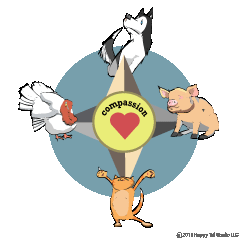Points of Compassion
In the U.S. and China, meat consumption is relatively high compared to global rates. Despite the growing consensus on animal sentience, seemingly few people question the practice of eating animals as a moral issue. Though across the U.S., strong public interest in “humane” meat has grown. Subsequently, considerations of the “humane myth” have also been on the rise.
Buzzwords can be used to reinforce a paradigm, precisely so they remain under-evaluated. So, while “humane meat” may amount to “less suffering” and better conditions, among people who choose to reduce (or refrain from) meat eating on moral ground, “better” isn’t necessarily enough. Critics of “humane meat” branding suggest this trend reflects an odd consumer demand: mediating the tension between satisfying taste cravings while being reminded that it’s okay to care about farm animal welfare, to a point.
Considered critically, it’s worth questioning the underpinning notions. Like the word “natural,” which can mean so many things that it hardly means anything, the term “humane” has become increasingly common. Clearly, the “humane meat” concept brands itself as upholding a basic commitment to animal welfare. The label offers an alternative to the kinds of farm animal practices that have been increasingly scrutinized. The terms may even be applied to birds, who are currently exempt from the federal humane slaughter act although more than nine billion chickens and turkeys are slaughtered each year.
“A critique does not consist in saying that things aren’t good the way they are. It consists in seeing on just what type of assumptions, of familiar notions, of established and unexamined ways of thinking the accepted practices are based… To do criticism is to make harder those acts which are now too easy.” ~ Michel Foucault
It is heartening to see an emerging popular interest in how animals in agriculture are treated. Advocates for vulnerable populations like farm animals -on both sides of the issue- take on some tough questions. These complex concerns are personally and culturally embedded, and worthy of careful reflection. For those who include all animals on the moral compass, “humane” often means eliminating or limiting meat eating. For those unsure about the levels of care to extend to farm animals, be willing to investigate: does “humane” or “humanely raised” label mean what you think? Read the standards and decide for yourself.


